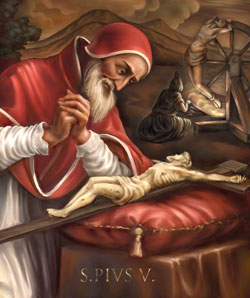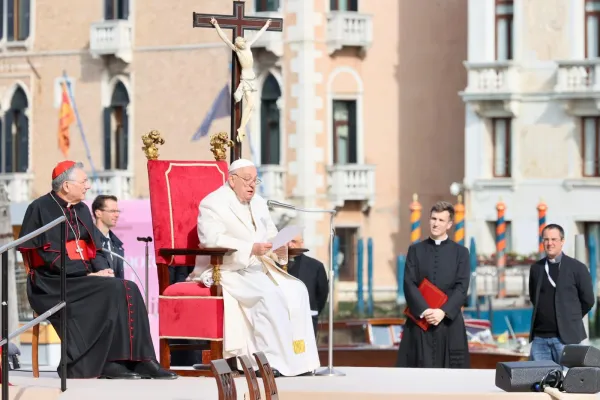Pope Francis’ visit to Venice showcases art as means of encounter, fraternity
Pope Francis delivers his homily during Mass in St. Mark's Square in Venice, Italy, on April 28, 2024. Credit: Daniel Ibañez/CNARome Newsroom, Apr 28, 2024 / 09:35 am
Pope Francis had a full slate of events Sunday during his day trip to Venice, a trip that tied together a message of unity and fraternity with the artistic patrimony of a city that has been a privileged place of encounter across the centuries.
“Faith in Jesus, the bond with him, does not imprison our freedom. On the contrary, it opens us to receive the sap of God’s love, which multiplies our joy, takes care of us like a skilled vintner, and brings forth shoots even when the soil of our life becomes arid,” the pope said to over 10,000 pilgrims gathered in St. Mark’s Square.
Framing his homily during the Mass on the theme of unity, one of the central points articulated throughout several audiences spread across the morning, Pope Francis reminded Christians: “Remaining united to Christ, we can bring the fruits of the Gospel into the reality we inhabit.”
“Fruits of justice and peace, fruits of solidarity and mutual care, carefully-made choices to preserve our environmental and human heritage,” the pope continued, seated center stage in a red velvet chair and vested in a white cope.
Pope Francis arrived in Venice early Sunday morning for a day trip to the prestigious Biennale art exhibition — which is celebrating its 60th anniversary — where the Holy See’s pavilion, titled “With My Eyes,” dovetails with this year’s broader theme: “Foreigners Everywhere.”
The pope’s visit also holds a deep meaning as Francis is the first pontiff to visit the Biennale — where the Vatican has held a pavilion since 2013.
In his homily, Pope Francis pointed out that our relationship with Christ is not “static” but an invitation to “grow in relationship with him, to converse with him, to embrace his word, to follow him on the path of the kingdom of God.”
Francis built upon this point to encourage “Christian communities, neighborhoods, and cities to become welcoming, inclusive, and hospitable places,” a point he linked to the image of the city of Venice as a “a place of encounter and cultural exchange.”
Pope Francis observed that Venice “is called to be a sign of beauty available to all, starting with the last, a sign of fraternity and care for our common home,” the pope continued, highlighting the tenuous situation of Venice, a UNESCO World Heritage Site, which faces a myriad of problems ranging from excessive tourism to environmental challenges such as rising sea levels and erosion.
After the recitation of the Regina Caeli, the pope entered St. Mark’s Basilica to venerate the relics of the evangelist before leaving by helicopter to return to the Vatican as pilgrims and tourists bid farewell from land and sea.
Earlier in the morning the Holy Father met with female inmates, staff, and volunteers at Venice’s Women’s Prison on the Island of Giudecca, where he spoke on the topic of human dignity, suggesting that prison can “mark the beginning of something new, through the rediscovery of the unsuspected beauty in us and in others.“
The deeply symbolic visit was followed by a brief encounter with the artists responsible for the Holy See’s pavilion at the Biennale, where the pope encouraged artists to use their craft “to rid the world of the senseless and by now empty oppositions that seek to gain ground in racism, in xenophobia, in inequality, in ecological imbalance and aporophobia, that terrible neologism that means ‘fear of the poor.’”
The Holy Father traveled by a private vaporetto, or waterbus, bearing the two-tone flag of Vatican City, to the 16th-century baroque Basilica of Santa Maria della Salute, which sits on the Punta della Dogana, where he met with a large group of young people.
Reflecting on the visit as a “beautiful moment of encounter,” the pope encouraged the youth to “rise from sadness to lift our gaze upward.”
“Rise to stand in front of life, not to sit on the couch. Arise to say, ‘Here I am!’ to the Lord, who believes in us.” Building on this message of hope, which the pope emphasized is built upon perseverance, telling them “don’t isolate yourself” but “seek others, experience God together, find a group to walk with so you don’t grow tired.”
The pope made his way to St. Mark’s Square in a white open-top golf cart bearing the papal seal, where he closed his visit with Mass. At the end of the Mass Archbishop Francesco Moraglia, the patriarch of Venice, thanked the pope for his visit.
“Venice is a stupendous, fragile, unique city and has always been a bridge between East and West, a crossroads of peoples, cultures, and different faiths,” Moraglia noted.
“For this reason, in Venice, the great themes of your encyclicals — Fratelli Tutti and Laudato Si’ — are promptly reflected in respect and care for creation and the person, starting with the good summit of life that must always be respected and loved, especially when it is fragile and asks to be welcomed.”





